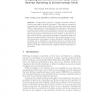Free Online Productivity Tools
i2Speak
i2Symbol
i2OCR
iTex2Img
iWeb2Print
iWeb2Shot
i2Type
iPdf2Split
iPdf2Merge
i2Bopomofo
i2Arabic
i2Style
i2Image
i2PDF
iLatex2Rtf
Sci2ools
107
click to vote
WWIC
2005
Springer
2005
Springer
Mitigating Interference Between IEEE 802.16 Systems Operating in License-Exempt Mode
A rudimentary approach to mitigate interference issues in license-exempt 802.16 systems is presented. This approach operates by permitting each Base Station (BS), and associated Subscriber Stations (SSs) to remain inactive for a specified fraction of the time. Other systems can then transmit with a reduced likelihood of interference. A simulator was developed to determine how this system performs. The results show that the throughput of the system is very sensitive to the fraction of time each BS is active; the system throughput is maximised when each BS is active less than 40% of the time for the scenarios studied. The results demonstrate a discrepancy between uplink and downlink throughput which can be attributed to the greater amount of overheads in the uplink. Finally, the results show that broadcast information being transmitted periodically at full power has a significant detrimental impact on the system.
Interference Issues | License-exempt 802.16 Systems | Rudimentary Approach | Wireless Networks | WWIC 2005 |
Related Content
| Added | 28 Jun 2010 |
| Updated | 28 Jun 2010 |
| Type | Conference |
| Year | 2005 |
| Where | WWIC |
| Authors | Omar Ashagi, Seán Murphy, Liam Murphy |
Comments (0)

